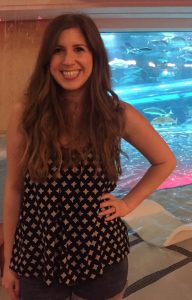
Rachel is a member of the SN working group. She is currently working on new statistical techniques to infer cosmological information from Type Ia Supernova (SN Ia) data. She is also interested in studying correlations between SN Ia properties and properties of their host galaxies.
Rachel is also one of the co-coordinators of Education & Public Outreach (EPO) for DES. She is very passionate about science communication and learning how to best inspire enthusiasm for STEM. Rachel is also currently working on several science education research projects. She is particularly interested in studying how scientists communicate their work and their attitudes towards public engagement. She is also interested in evaluating EPO projects and learning how to improve EPO programming and techniques.
We asked Rachel a few more questions — here’s what she had to say:
What is your favorite part about being a scientist?
When did you know you wanted to be a scientist?
What motivates / inspires you?
Do you have any hobbies or play any sports?
I love to cook and host dinner parties! I don’t know if hostessing counts as a hobby, but I love getting all my friends together and creating a fun, entertaining, and welcoming space.
Unfortunately, I’m not the most athletically gifted person. I do enjoy watching sports, though! My husband and I are big UCLA football fans (Go Bruins!) and I’m currently in three fantasy football leagues.
What is your favorite book, movie, and/or TV show?
Favorite Book: The Phantom Tollbooth
Favorite Movie: Monty Python and the Holy Grail
Favorite TV Show: Right now, it’s a three-way tie between The Office, Parks & Recreation, and Better Call Saul
If you weren’t a scientist, what would your dream job be?
If I weren’t a professional scientist, I’d like to be a professional science educator/communicator, or in some job where I could continue to inspire interest in science in some way.
If I were to leave science entirely, I’d want to be a wedding planner! I love planning parties, especially for other people, and think my organization skills and detailed-oriented personality would be put to good use. I’d also just have so much fun helping people make their day special!
What do you think has been the most exciting advance in physics / astronomy in the last 10 years?
What do you think has been the most exciting advance in science / technology in the last 10 years?
Any advice for aspiring scientists?
I’d like to give some standard and maybe some not-so-standard advice:
As I think many of my colleagues would agree, taking as many math and computer programming courses as you can is essential! I only really started computer programming in college – I wish that I had started earlier and that I had more time to really explore the functionality of different languages. Also be sure to learn (and appreciate) statistics! So much of my job now relies on knowledge of statistics. I’ve learned a ton on the job, but I wish I would have realized sooner just how important it would be.
While being a scientist is incredibly gratifying, it is also incredibly challenging, both mentally and physically. You’re going to be spending a ridiculous amount of time researching, writing papers, and generally pushing your mind as far as it can go. Learning how to take care of yourself is just as important, if not more so, than learning how to be an effective scientist. Make sure you take the time to learn how and where you research/study best, what relaxes you, and what practices help you be your best self.